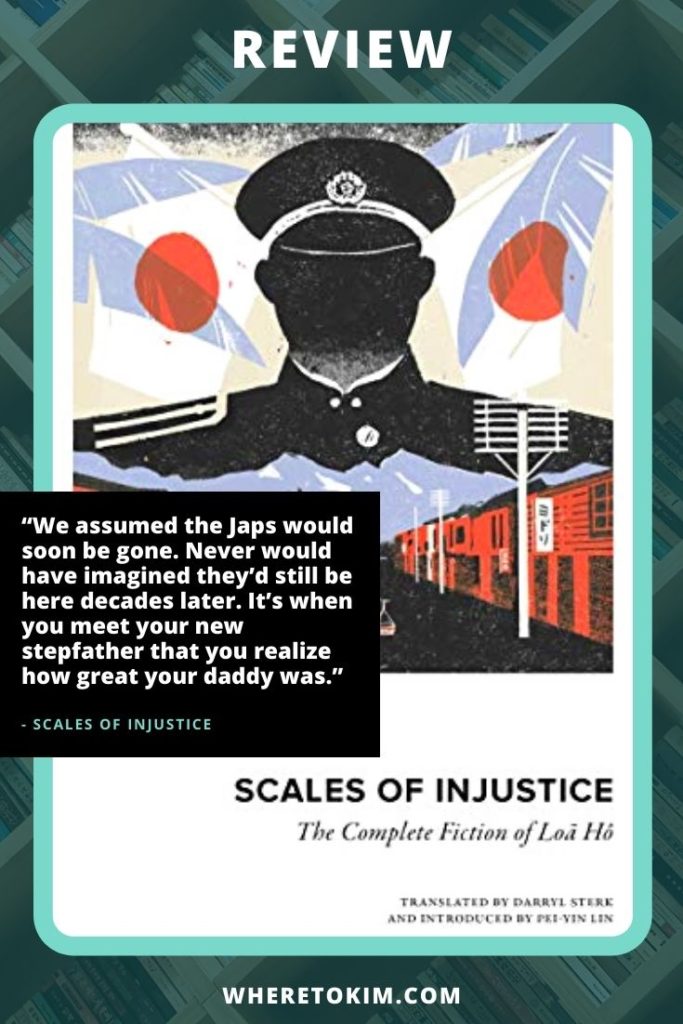The stories in Scales of Injustice give you an idea of the waters Taiwanese author Lōa Hō had to navigate to expose wrongs in society and still get his stories published in magazines.
Location: Taiwan
Scales of Injustice synopsis
Lōa Hô (also Lai He, 1894-1943) was a pioneering writer from Taiwan often called the ‘father of New Taiwanese Literature’. As a doctor during the colonial period in Taiwan, Loa witnessed the cruelty of Japanese rule and wrote stories which display both his sense of justice and social insight. His writing often utilized irony and satire to criticize the status quo, and his work provides a fascinating window into the struggle for Taiwanese self-determination during the early twentieth century.
Scales of Injustice contains the complete fiction of Loa Hô, with an expert introduction from Pei-yin Lin and explanatory notes by translator Darryl Sterk.
Book review
Background
Lōa Hō is described as the Father of New Taiwanese Literature because he promoted the vernacular language over Chinese in the 1920s. He is known for his humanitarian concern for the underprivileged. The stories he wrote are political and describe a sense of loss. His experiments with writing in Taiwanese reveal a desire to get closer to the lower end of the colonial social spectrum.
Since he mixed Taiwanese, which is primarily an oral language with no written standard, with Chinese and Japanese, the translation of the stories posed quite a challenge for translator Darryl Sterk. This was all the more so because the author sometimes self-censored his text to get it published in magazines. Each story is thoroughly annotated.
At the beginning of the book is an introduction by Pei-yin Lin explaining the events that prompted the author to write the stories. The stories are arranged in chronological and thematic order, although sometimes this is based on a best guess.
Pointing out injustice
The characters in the stories did what the author often could not do or say, what he himself would not survive, even if he had many lives. As a result, the author’s stories point out many wrongs in society.
The first story, The Story of Class Action, sets the tone for the rest of the book. In this story, a landlord with a bad temper lashes out at the poor who cannot pay the funeral expenses. The main character, Mr. Grove, is a sincere man, but he is only one against many. The other stories also deal with the gap between rich and poor. In Bumper Crop, you feel personally cheated by the sugar company. The title of the collection of stories, Scales of Injustice, adequately describes the overarching theme of the stories.
The stories show what life was like for the common people in Taiwan in the early 20th century. The protagonist in Mr. Snake sells a remedy for snakebites but has no license. While others believe he is a great doctor, he uses statistics and analysis to prove otherwise. This is one of the lighter stories. Another fun story was A Prank LETTER. Some of the stories, such as Hope for the Future and The History of the Rich Clans read like medieval European stories from Ireland and Scotland, with the difference that they are set in Taiwan.
I especially liked The Poor Thing Died, a story that spans decades and reads more like a tale compared to other stories that revolve around incidents or encounters. In this story, a young girl is adopted by another family with the intention of her marrying that family’s son when she comes of age. Many things happen to her after her adoption. This story is easy to read and does not require much cultural knowledge. It is about the value of a daughter: is she really priceless to anyone?
Considering all the stories together, you get an idea of the waters Lōa Hō had to navigate to expose wrongs and still get his stories published in magazines. His subtle sense of humor and self-mockery is evident in many of the stories, although you only get that if you also read the translator’s annotations and the book’s introduction. And even with those notes, a modern reader will not fully grasp the true meaning of the stories.
For whom?
Although I was interested in the content of the stories, many of them are not particularly entertaining. The focus of the stories is on events in society rather than on the characters or their feelings. This also makes these stories feel older than, say, the Korean short story collection The Underground Village from the same publisher, which is set in Manchuria. You probably won’t read this book from front to back, but rather one story at a time.
I would recommend Scales of Injustice to those with an (academic) interest in this historical period and Taiwan’s literary scene. I would not read this collection of stories purely for entertainment. Rather: treat this collection of stories as a historical document. The translator’s annotations (much appreciated) support that feeling. Since all the annotations are at the end of the stories, you might consider purchasing a paper edition rather than an ebook to increase readability.
Interested?
Get your copy of Scales of Injustice from Amazon.
Book details
Title: Scales of Injustice
Author: Lōa Hō
Translator: Darryl Sterk
Language: English
Publisher: Honford Star
Pages: 288
ISBN (13): 9781999791223
Publication date: 27 April 2018
About the translator
Darryl Sterk is a Chinese-English literary translator from Canada who is now based in Hong Kong, where he teaches translation at Lingnan University, and Taiwan, where he has a wife from Taiwan and a Taiwanese-Canadian daughter. He has mainly translated contemporary Mandarin fiction from Taiwan into English, and feels stimulated by the challenge of all the Taiwanese (Taiwan Hoklo) in Lōa Hô . As a scholar, he researches translation to and from the Taiwanese indigenous language Seediq, especially for the feature film Seediq Bale.







